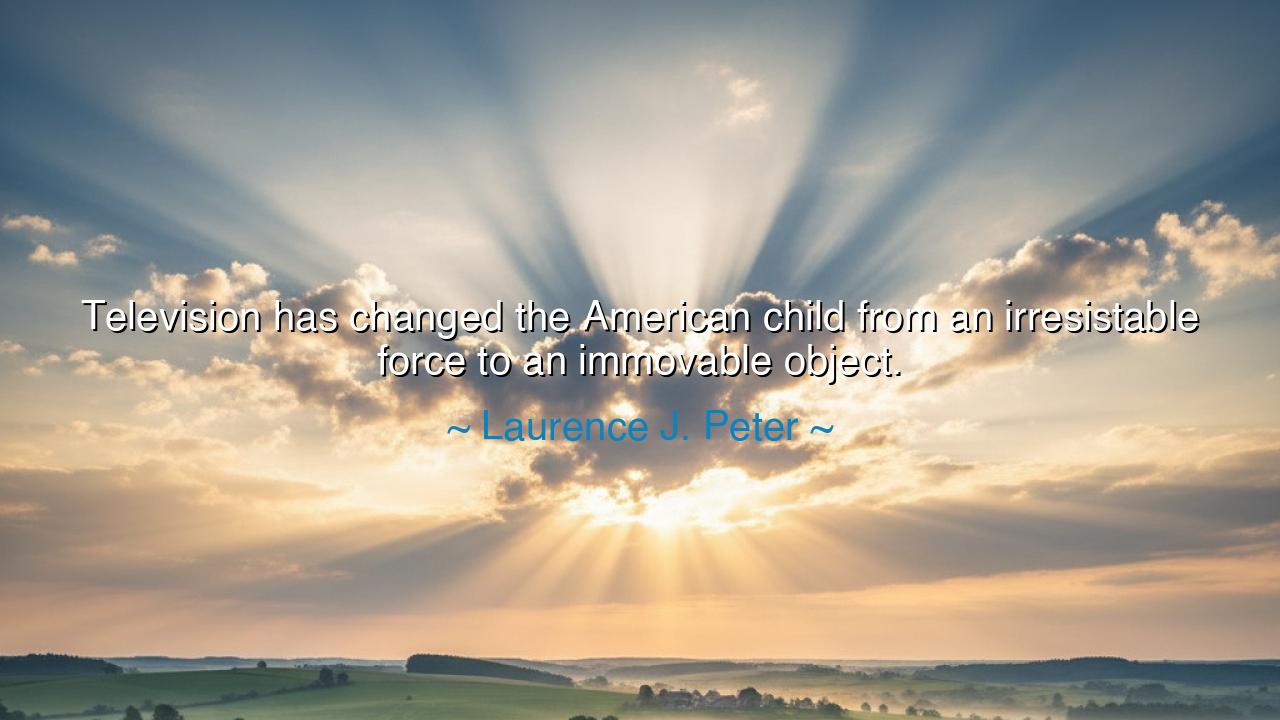
Television has changed the American child from an irresistable
Television has changed the American child from an irresistable force to an immovable object.






Hear the voice of Laurence J. Peter, who gazed upon the children of a new age and spoke with piercing wit: “Television has changed the American child from an irresistible force to an immovable object.” At first, the words sound humorous, a jest made at the expense of youthful habits. Yet beneath the humor lies a grave warning: that what once defined childhood—boundless energy, restless curiosity, unstoppable vitality—has been stilled, subdued, and chained by the glow of the screen.
The irresistible force of the child has always been a thing of wonder. In the old days, children spilled into the streets, fields, and forests with unquenchable vigor. They climbed trees, built forts, chased one another with laughter, and tested the boundaries of their world with fearless curiosity. No wall could contain them; no rule could silence their hunger to explore. They were storms of life itself, reminding even the weary elders of the fire that courses through the human spirit.
But with the coming of television, that fire dimmed. The immovable object replaced the restless adventurer. Instead of running through the fields, the child now sits motionless before the glowing box. Instead of exploring the mysteries of nature or testing their own strength, they passively absorb images crafted by others. The vitality of movement gives way to the stillness of consumption. And so Peter speaks: the child, once unstoppable in action, becomes unyielding in stillness.
Consider the transformation of the mid-20th century. Before the rise of mass television, communities thrived on outdoor games, storytelling, and face-to-face play. But as households filled with screens, families gathered less around fires or tables and more around the flickering light of programs. Children, who once shaped their own adventures, became shaped by the images and narratives poured into them. This was a revolution—not of politics or industry, but of the very nature of childhood.
History shows us other moments when invention reshaped youth. When the printing press arose, it filled children with books, but still demanded active engagement—the turning of pages, the act of reading, the use of imagination. When the radio came, it filled homes with sound, but left room for movement and play. But television combined sound and sight, immersing the child so completely that their bodies became as still as statues. Thus Peter’s words are not only clever but prophetic: television was unlike anything before it, for it did not just entertain—it immobilized.
Yet we must not fall into despair. For every tool is double-edged. Television can indeed imprison, but it can also teach, inspire, and broaden horizons if used with wisdom. The fault lies not only in the device, but in how it is wielded. If parents and teachers guide its use—balancing screen time with play, learning, and exploration—then the child can be both irresistible force and thoughtful learner. The danger comes when the screen becomes the master and the child its servant.
So what lesson must you take, O listener? It is this: guard the energy of youth, for it is the spark of the future. Do not allow technology to still what should run wild. Encourage children to move, to create, to question, to sweat beneath the sun and dream beneath the stars. Let screens serve as windows, not prisons. And for yourself, remember too that passivity dulls the soul—movement, curiosity, and exploration keep the human spirit alive, no matter one’s age.
Thus, remember Laurence J. Peter’s wisdom: “Television has changed the American child from an irresistible force to an immovable object.” It is a warning not only for children, but for all of us. For each of us carries within us that restless, curious child. Guard it well, lest the glow of the screen extinguish its fire. Move, create, explore—and remain forever an irresistible force.






AAdministratorAdministrator
Welcome, honored guests. Please leave a comment, we will respond soon